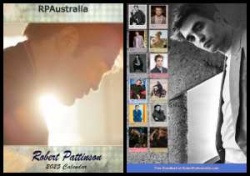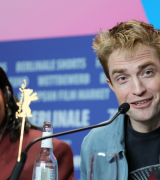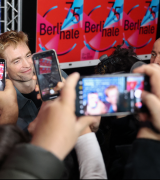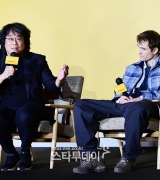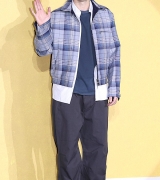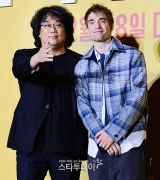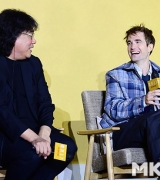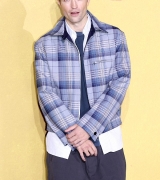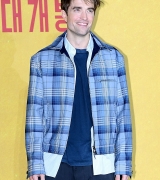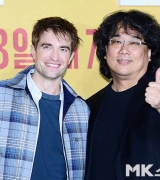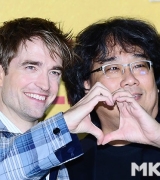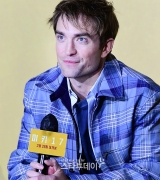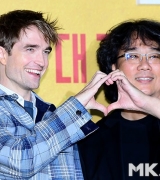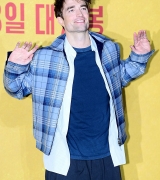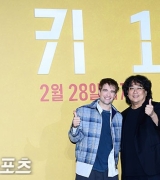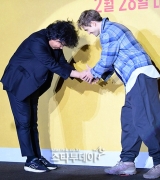
During the recent press junket in L.A. for “The Lost City of Z”, Rob had a in-depth chat with Steven Weintraub of Collider about his involvement in the film, future projects, and much more. Here’s what Rob had to say to Collider.com:
Here’s what Robert Pattinson had to say:
COLLIDER: You won’t remember this, but I actually interviewed you in New York for “Remember Me”, back in 2010. So, you’ve landed on your feet.
ROBERT PATTINSON: God. So long ago now and it was 2010.
Yeah. Long time ago.
PATTINSON: Doesn’t feel like a very long time ago.
Time goes by very fast. There’s something I want to talk to you about: I’m a legit fan of your acting. One of the things that I am impressed by is the movies you’ve done. You’re going for cool roles with good directors and you’re going after scripts. For example, I really enjoyed your work in “The Rover”. And I think that one of the things is a lot of actors have to work because of, you know, they have to pay the mortgage. And I think that one of the benefits you have is you gained that financial freedom after a certain franchise to be able to pick the projects you want to do. Can you sort of talk about what you’ve tried to do over the few years as an actor and the roles you’ve been gravitating towards?
PATTINSON: Yeah, that’s completely right. I mean, I have been incredibly fortunate to be able to do that. But I also think if you get sort of early success there’s always this part of you which feels like, “I need to address the imbalance, I need to kind of earn that success after the fact†[laughs]. And so I try to find roles that are hard and also, I still find now, even after I’ve done loads of really random movies, directors are really surprised that I want to play the parts that I want to play. They just assume that you want to only do the honorable good guy lead who saves the day or dies at the end [laughs]. It’s like, I don’t know, I just kind of don’t think any audience would want to see me do that, or I always think that you have to have a certain understanding of what an audience would want to see from you as a public person as well as a character. So yeah, I generally try and find ways to get my characters severely punished [laughs].
The other thing though is a lot of people I’ve spoken to talk about getting pigeonholed in a certain type of role and the only way you can sort of break that is to show people that you don’t want to do just this one role again and again and again.
PATTINSON: Yeah, and it’s amazing as well how people if you want to get a different role, the majority of time the producers or directors want to see you play a similar role already, whereas the only thing I really want to do is swing wildly from one end to the other [laughs]. But then I think after it’s just starting to kind settle into the kind of area that I want to be in. I knew it would take a long time, but like this year working with Claire Denis and I’m probably going to work—I don’t know if I can say it yet [laughs].
Yeah, don’t. I don’t want to get you in trouble. But by all means, say it.
PATTINSON: I think I’m going to do something with Antonio Campos as well. Do you know Antonio Campos is?
I do.
PATTINSON: The part with him is like –I mean, he actually wanted me to do a different part and I was like, “No this is the part.” It’s this absolutely degenerate [laughs]. But then I did this thing with the Safdie Brothers. I don’t know if you know the Safdies?
I’m not as familiar.
PATTINSON: They did that film called “Heaven Knows What” about west side junkies.
I definitely didn’t see it, and I don’t think I want to pretend that I did.
PATTINSON: It’s incredible. I have this movie coming out this year with them, which is really like, I don’t know why they trust me on it but it’s playing –It’s like so specifically Queens-related, and I’m obviously not at all acquainted [laughs].
You’re not from New York? I’m surprised to learn this!
PATTINSON: And everyone’s non-actors in it, and we’re pretty much…
Well, American Honey did a great job without traditional actors.
PATTINSON: Yeah, I think it’s the same, man. Elaine or Jen, who cast that? God, my memory is so shit. Yeah, I think it’s the same casting people who did American Honey. But a lot of the people from American Honey came from the Safdie Brothers’ first movie Heaven Knows What.
Oh, there you go.
PATTINSON: Yeah. But she is an amazing street-casting person, she is incredible. And some of the people in—There’s this movie called Good Time, and it’s crazy. I literally can’t wait for it to come out.
That’s what Megan was saying.
PATTINSON: Oh really?
She was saying, “You need to see this movie,†and I’m like, “Okay!”
PATTINSON: It’s just really fun. I mean, it’s kind of like, it’s so scrappy and stuff but you know, I watch so many movies and I find a lot of them very predictable, and also, a little bit playing it safe.
That’s why you should go see The Handmaiden.
PATTINSON: I love The Handmaiden. It’s fucking amazing.
If you want to talk about movies that take twists and turns. I was sitting in the theater, jaw on ground, six times.
PATTINSON: No! I literally thought it was absolutely incredible. And also, I didn’t really know what it was about, and I remember watching in this theater in New York and there’s so many dirty, creepy old men sitting around [laughs] and I was watching like “What? This movie is crazy sexy! I had no idea at all!â€
But you mentioned, that’s the type of movie you will not get made in America anymore. Maybe, I don’t even know if it could have ever been made in America.
PATTINSON: It’s that main period where it could have been, but like…
Maybe the early 70s?
PATTINSON: Or 80s. There’s a bunch of…
Oh, that’s true!
PATTINSON: Yeah, yeah. But yeah, I just find it so – I mean, I love going to a theater and just being like, “Wow!†That and I mean, Embrace of the Serpent. Did you ever see that?
I have not, but I’ve heard of it.
PATTINSON: Unbelievable. But yeah, I don’t understand. But this thing I did with the Safdies, it’s kind of very sort of subversive, but at the same time it’s a real genre film. So I think people will see it and kind of be quiet, it seems it’s weirdly accessible for a very strange movie. So, I hope people will like it.
Well, jumping into why I get to talk to you, the actual movie, The Lost City of Z.
PATTINSON: Yeah, sorry!
No, it’s fine! It’s just I really, really enjoyed this film. I walked in not knowing that much. I was captivated beginning to end. Was this a part that you went after? Did James [Gray] come to you? How’d you get involved?
PATTINSON: I met James like a billion times over the years. He was in my top five of people I wanted to work with. I loved We Own the Night, Two Lovers and everything he’s done, really. Even when I just started acting that was the guy I wanted to work with. I’ve been attached to a bunch of different things with him. With this, he gave me the book and I read the book and went “Yeah the book’s really cool. But I mean like, what part?†Because normally the person’s not mentioned that much and I was really young when he first gave it to me, so I was like, “Uh, is it the…?” I think initially he was thinking about me playing the son, and it just kept kind of developing, but he never quite mentioned which part it was [laughs]. But yeah, I really just wanted to work with him and also Darius Khondji.
So whose idea was it for the beard, for losing weight, or whatever you did to get ready for this role?
PATTINSON: Um. No managing weight [laughs].
We should mention that you are eating peanut M&M’s.
PATTINSON: And if there wasn’t a tape recorder, I’d just pour them into my mouth [laughs]. Well, the beard thing was because Costin in reality had this big Victorian mustache and so I was initially intending to have a mustache, but the real Costin was kind of a stout, stocky, short guy and having a big mustache looks very different on that body shape person when I’m kind of a tall, skinny person, it ends up looking sort of quite like Noel Coward-ly. So I thought the mustache wouldn’t really work. And then we just did the screen test, and I was just about to shave off the bottom, and James was like, “No, no! Don’t do that!” which is weird because I end up being the only soldier in World War I with a beard. [laughs] You weren’t allowed to have beards.
Artistic liberty. I understand.
PATTINSON: It’s one of those parts where it’s so Charlie [Hunnam]’s movie and I had a ton of ideas about stuff but nothing really mattered until I could see what story Charlie and James wanted to tell. I had a very specific idea of what the story was, it was actually quite different how it ended up being told when we’re doing the movie, and so I was just kind of just reacting on the fly, and I guess that in a lot of ways just became my character just being along for the ride in a way.
I got to tell you though, it’s just such an incredible story, but I am so impressed with the filmmaking. I know you guys shot on film. Did you guys even remember what the sound of the camera was? Because no one shoots film and it’s so rare.
PATTINSON: You know what, I shoot on film a lot. I pretty much, pretty much every movie I do shoots on film.
Really?
PATTINSON: Yeah.
Even Good Time and Damsel.
PATTINSON: Damsel not but…
High Life?
PATTINSON: I’m not sure if she’s going to shoot on film, but Good Time was. And Good Time was shooting on 35 and we were all shooting completely guerrilla as well, I mean, it was crazy. But I kind of know really, if someone says they’re going to shoot on 35 they’re probably a better filmmaker. They’re either pretentious or better [laughs].
I think James lands in the field of he’s a good filmmaker.
PATTINSON: I mean he wouldn’t, it’s just unthinkable for him to shoot on anything other than on film.
The thing is though what I’m so impressed by is that you shot in the middle of these jungles. We’re talking remote location to bring cameras in there with film, that’s borderline Apocalypse Now.
PATTINSON: But that’s the thing, because I shot The Rover on film as well, and really the technology behind an analog camera is so much more hardy than a digital one, especially in the heat or humidity or anything. I mean, to be honest, everyone thinks that a digital camera is more reliable and every single time I work on any movie, it’s just as many problems, the memory card doesn’t work or blah blah blah, it overheats; it’s the same volume as another camera. I think people are bit taken in by it. The only thing is just doing really, really long takes, but most of the time if you’re doing really long takes they’re probably pretty bad [laughs].
Although I will say that I’ve seen some long takes in film and in TV recently that have really impressed me, just really well done.
PATTINSON: There’s definitely a way if you really, if you are using a digital camera specifically for that reason you have in mind from the beginning, then yeah, it’ll work. But like if you’re just shooting a normal film and just kind of just shooting extra stuff because you can because you’ve got the memory space, it’s a bit pointless. I think there’s also something about –I’ve always found with film it heightens the experience a lot, but more knowing that it’s difficult to work with, it requires experts—I mean a digital camera does too, but I mean there’s just something about the fact that you can actually run out of film so you have to do something.
Hugh Grant told me a really funny story that he still gets very nervous when people call action because especially when the camera’s going, because you know it’s like, “Perform!” So he asked the AD or people to say “Go!” Not even action, because it gets in his head. So I want to ask you, do you have that sort of twitch if you will when “Action” is called? Do you have any sort of neuroses? Or are you sort of like, “I’m inâ€?
PATTINSON: I’m sort of in before. I was always think there’s an interesting kind of gameplay with where and how you start a scene, where the action happens. I actually get really pissed off when someone doesn’t say “action,” because I just find all of this confusion when someone’s like [whispers] “Okay…” And then it’s like, “Oh the fuck is it? What is ‘okay?’ Just say ‘action,’ everybody else says ‘action!'” Everything just starts and everyone is just like limping into the scene. As soon as you hear action and then you’re so immediately into the scene you can actually dictate the pace of it, because everyone else is supposed to be hearing it at the same time, it’s like a 100-meter sprint and you’re hearing the starting pistol, you can use that for performance.
I always love asking about memorable moments from filming. I would imagine making Lost City, there must be a day or two that you’re gonna remember forever.
PATTINSON: Yeah, probably our last shot on the last day. It was pretty nuts. For some reason we went there in the rainy season and people just could not get the concept that like it’s just going to rain every day. Like, “Come on, guys, it’s going to rain every day! It’s the rain season! Let’s just prepare ourselves for rain.” And every single day there’d be this total confusion when like it started raining and all of the sudden everybody would be like, “WAHHH! Run!” and we always waited too late and we’d have to go –We were in like little tin boats in the middle of an electrical storm going down a river, I mean, it’s like crazy dangerous. But on the last day though, it had been raining in the mountain for hours and hours and hours, and suddenly the flood—like all the rain—started coming down the river, and the river just rose and rose and rose like a foot every couple of minutes and we were on a tiny little sandbank and it was in the night and we were in a nature reserve so you couldn’t have any proper light, so it was all just a few battery-powered lights, and you could barely see anything and you’re covered in sand fleas and stuff. And then suddenly, as the river got higher there all these black caimans just floating past us and trying to get on the sandbank with us, and everyone was trying to carry an entire film crew’s worth of equipment just up the side of a riverbank into the forest. And we just had to walk a two-and-a-half-hour hike at 3 a.m. through pitch black forest with about four torches with like a hundred people to get back to the town. It was completely mental. And it was very fun and a very unique experience.
It’s really good then that the movie turned out so great. Because if you did this entire challenging shoot and then the movie was shit…
PATTINSON: Either way, I wouldn’t really mind. It was so much fun doing it, it could have been just as fun to be a spectacular failure too.
I’m very happy with how it turned out though. You mentioned you have stuff in development. I’m really excited for High Life. I’m curious about what you’re thinking of for the future, and of course I’m going to ask you, the superhero genre is the most popular thing on the planet and I’m sure people have discussed it or at least it’s come up in a meeting. Is that an arena you want to play in? Or have you had sort of your franchise fill?
PATTINSON: Yeah, for sure. I just feel like it’s…it has to feel right and you have to –It’s partly the same thing –I feel like you have to earn something with an audience. If I just did it now, I think producers on any superhero movie, I think they wouldn’t trust me to do it the way I’d want to do it, because I’d want to do something basically really strange. I think you have to earn that freedom to do stuff like that. So I think, if I keep kind of chipping away, trying to do good movies and interesting, strange movies then people will eventually trust you to do that on a bigger scale.
I was going to say I can see you doing a good antagonist in a superhero movie, which would allow you to maybe pursue the strange and weird in a way that the protagonist could not.
PATTINSON: I’d love to do a kind of superhero-y, graphic novel-y thing if it was an original piece. It’s a very different experience when there’s already an audience for it. I’m always interested in Guardians of the Galaxy. I loved Guardians of the Galaxy.
And why wouldn’t you.
PATTINSON: It’s great to have these characters which no one really knows exactly what they’re going to be like; it’s a strange thing when people already have expectations of something. It’s strange to try and please people at the same time.
What was it about High Life? Was it the script? Was it your director? What is it about the project that excites you?
PATTINSON: I cannot believe I’m doing a movie with Claire Denis. I don’t understand how I got it. I feel like, I just keep thinking, “Oh, I know the finances are going to fall apart,” and I know it’s pretty serious financing now. But it also happens to be one of the craziest treatments and all of the people involved in that as well. I don’t know if you know the artist Olafur Eliasson.
I’m not as familiar as you are.
PATTINSON: If you see his work, his basic production design of a spaceship, black hole and stuff. I’ve seen some tests already and it’s unbelievable. And with working with Claire it’s literally rare to find a filmmaker who has not made a bad movie ever and I really think about that with Claire and every single thing she’s done. It’s kind of fascinating. Just one of those people I didn’t think that was a real thing, to be able to get a movie with Claire Denis. I thought they just sort of existed somewhere else.
I am very happy for you, that you’ll be able to pull this off. I think Mia Goth told me she was filming soon. But I guess it’s not filming yet.
PATTINSON: Yeah, no. Apparently we’re starting in August.
I hope the financing comes together.
PATTINSON: [Laughs]. It’s been two-and-a-half years now!
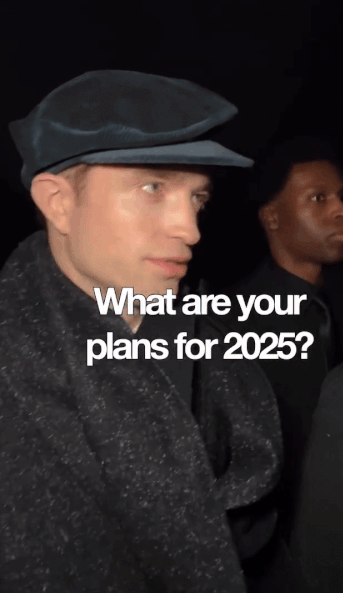
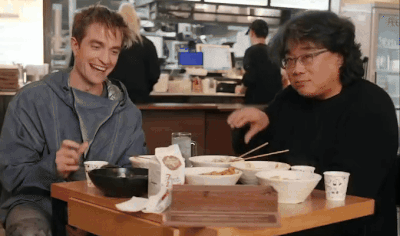



 Robert Pattinson for Dior Icons.
Via love_ci
Robert Pattinson for Dior Icons.
Via love_ci

 Turning the page on the calendar. Happy belat
Turning the page on the calendar. Happy belat

















